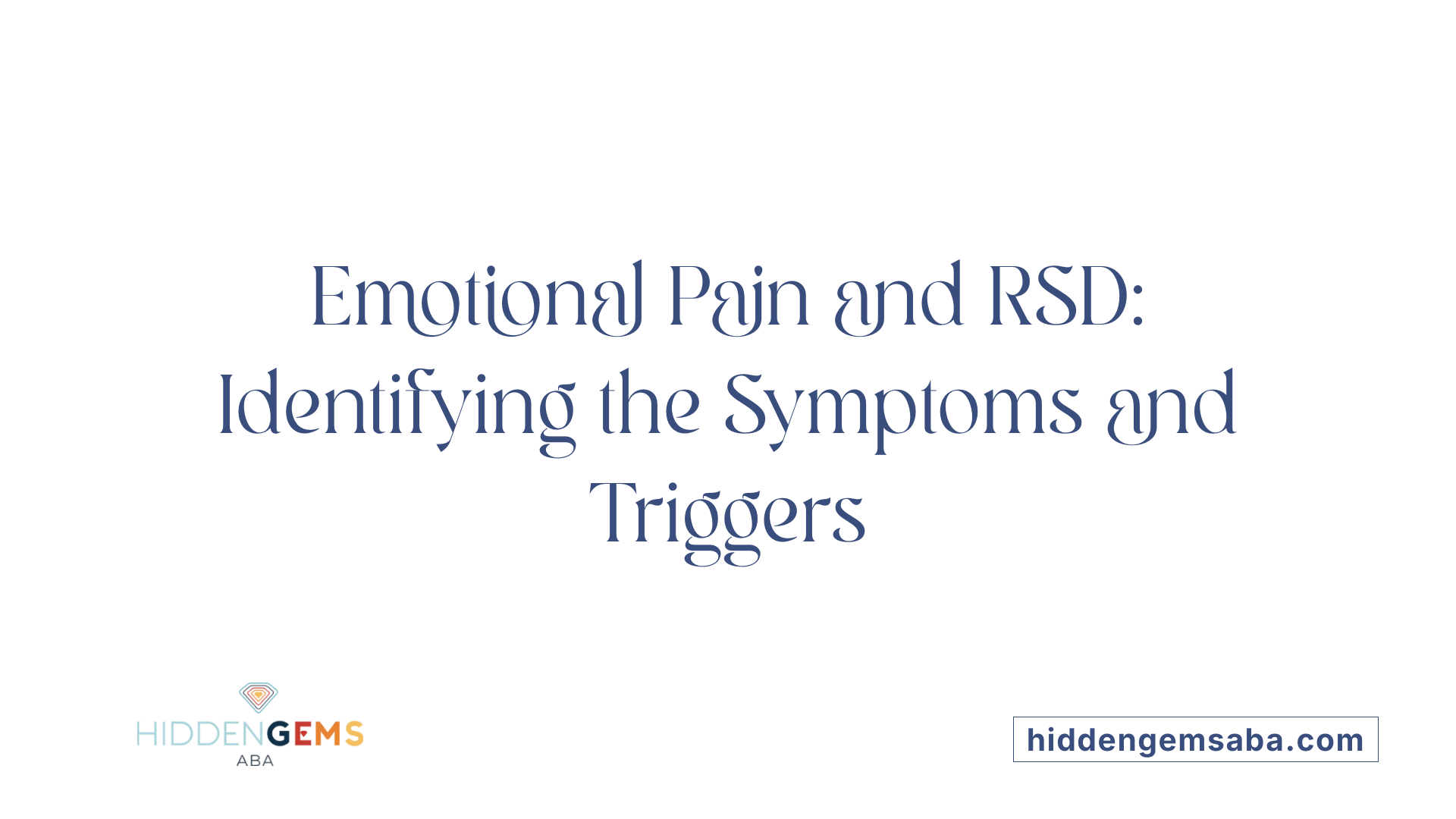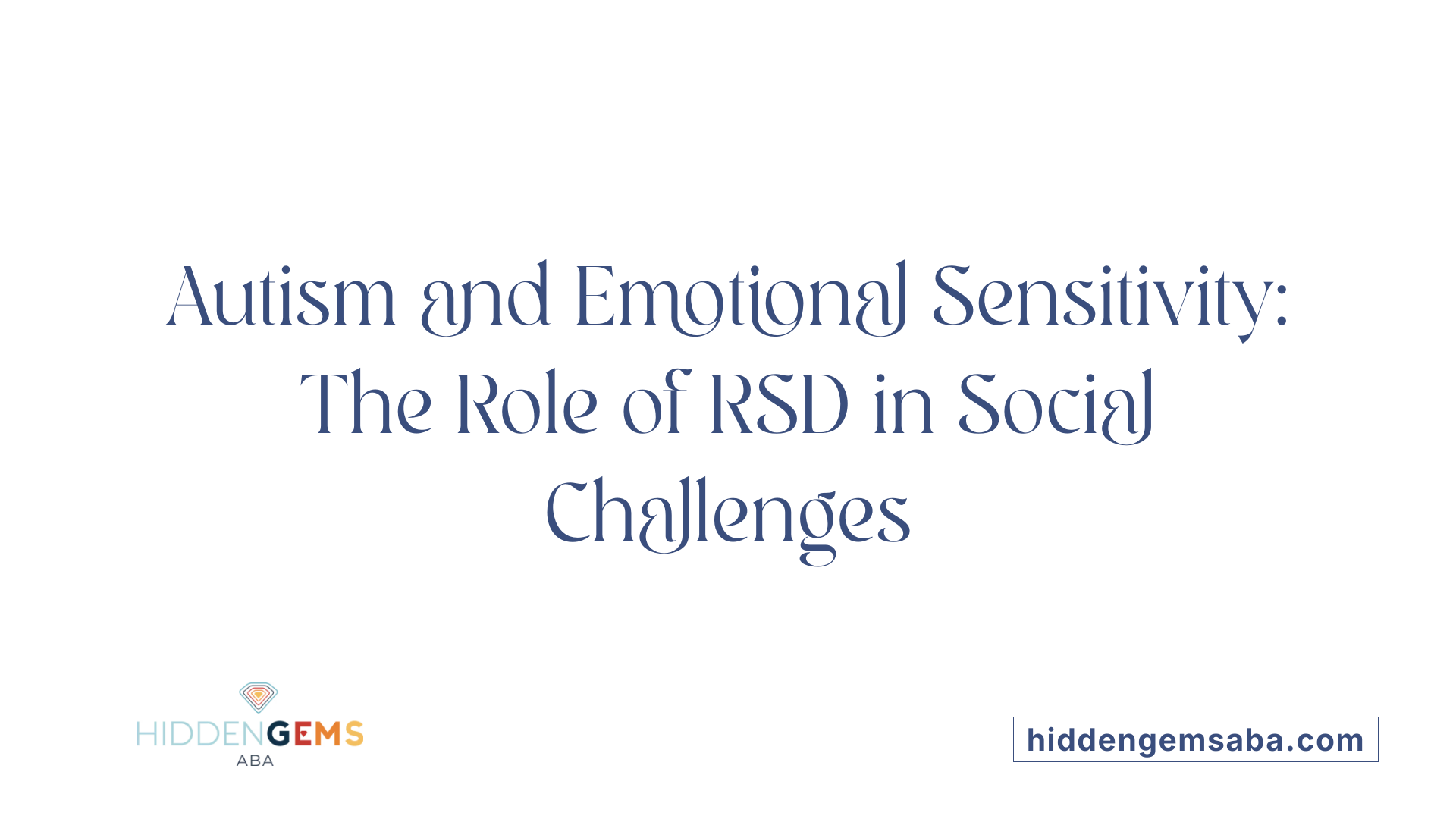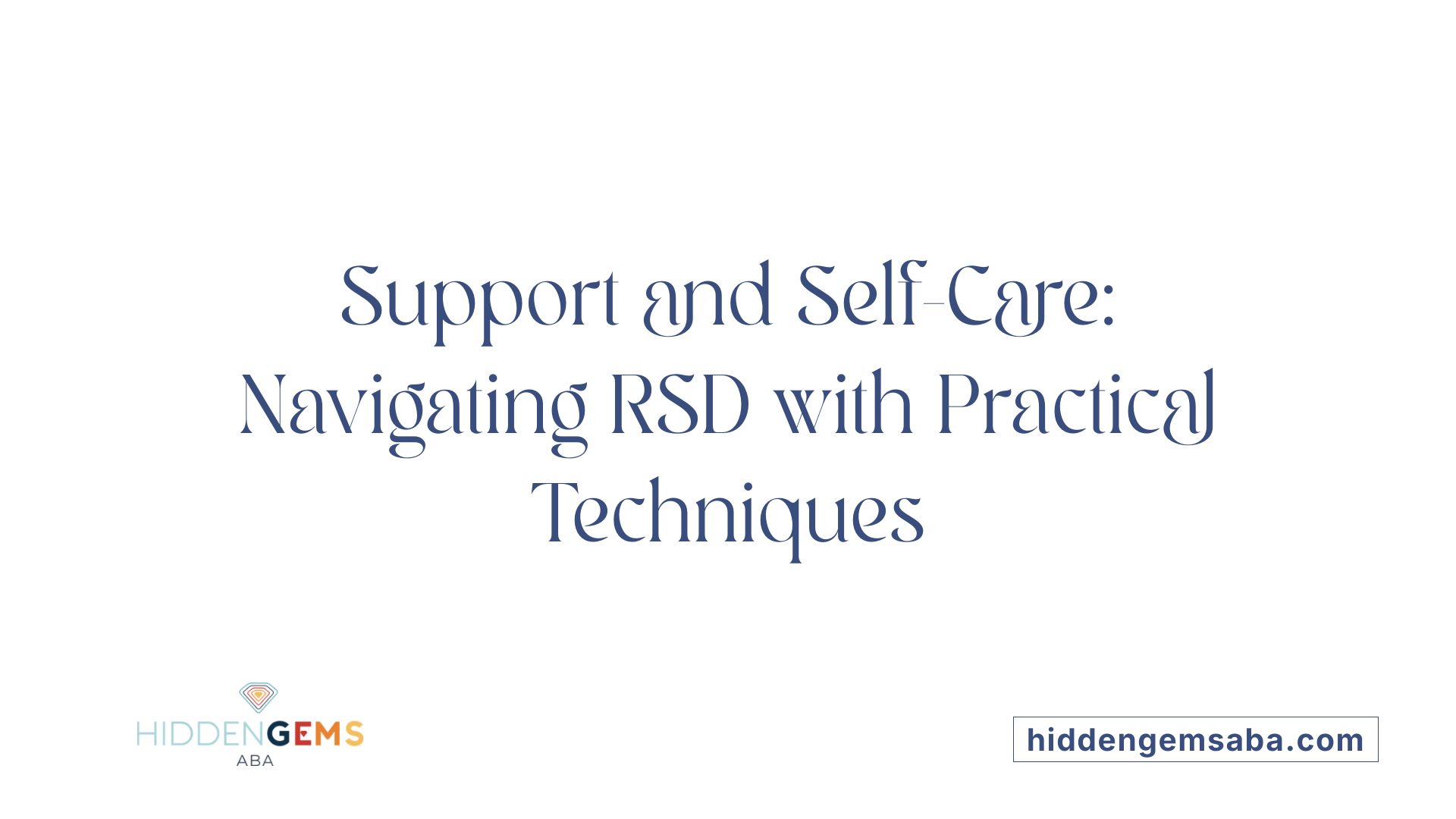Understanding the Emotional Landscape of Autism and RSD
Rejection Sensitive Dysphoria (RSD) is an often misunderstood emotional condition that frequently coexists with autism, impacting social interactions and emotional well-being. Though not officially classified as a diagnosis, RSD manifests through intense reactions to perceived rejection or criticism, shaping the experiences of many autistic individuals. This article explores the nature of RSD, its relationship with autism, how it manifests, and strategies for management, aiming to foster greater understanding and support.
What is Rejection Sensitive Dysphoria (RSD) and its Symptoms

What is Rejection Sensitive Dysphoria (RSD) and what are its symptoms?
Rejection Sensitive Dysphoria (RSD) is a condition characterized by intense emotional pain triggered by perceived rejection, criticism, or failure. While not officially classified as a diagnosis in the DSM, RSD is recognized as a trait commonly associated with ADHD and autism. Individuals with RSD often experience overwhelming feelings that can feel like their emotional wounds are reopening repeatedly.
This emotional turmoil manifests through symptoms such as feelings of embarrassment, sadness, anger, and sometimes rage. Many report physical sensations like nausea, difficulty breathing, or a deep ache that mirrors emotional pain. These reactions often come with low self-esteem, difficulty controlling emotional responses, and avoidance of social situations for fear of rejection.
People with RSD also tend to develop behavioral patterns aimed at preventing rejection. These behaviors include people-pleasing, setting unrealistically high standards to avoid disapproval, and withdrawing from social interactions. They may become hyper-vigilant, constantly on alert for signs of criticism, which intensifies their distress.
Since RSD can greatly impact daily life, various management strategies are employed. Gaining understanding about the condition, practicing mindfulness, and developing self-compassion can help individuals cope better. Therapeutic interventions, such as cognitive-behavioral therapy, and support from loved ones play vital roles in managing RSD.
By recognizing RSD's symptoms and triggers, individuals can begin to develop healthier responses, reduce emotional suffering, and improve their overall well-being.
The Intersection of RSD and Autism

How is RSD related to autism?
Rejection Sensitive Dysphoria (RSD) is deeply connected to autism because many autistic individuals experience intense emotional reactions when they perceive rejection, criticism, or social disapproval. Autism often involves increased emotional sensitivity and differences in sensory processing, which can magnify feelings of distress during social setbacks.
Autistic people tend to face higher rejection rates, partly due to misunderstandings and the need to mask their natural behaviors to fit societal expectations. This constant pressure can lead to heightened sensitivity to perceived rejection, fueling RSD symptoms.
Although RSD is not officially classified in the autism diagnostic criteria, it frequently co-occurs with autism spectrum disorder. Its presence can significantly influence emotional health and social relationships, causing some autistic individuals to avoid social interactions or become overwhelmed by minor criticisms.
Understanding how RSD manifests in autism helps both individuals and caregivers to interpret emotional responses more compassionately. It also underscores the importance of developing coping strategies that mitigate distress, such as seeking validation, practicing emotional regulation skills, and fostering supportive environments.
This awareness is crucial because recognizing the role of RSD in autism can lead to better targeted support, improving quality of life and social functioning for autistic individuals.
Additional insights about emotional sensitivity in autism
Autistic traits include heightened emotional sensitivity, which can cause responses that seem disproportionate to the situation. This heightened sensitivity often makes rejection or criticism feel even more painful, leading to emotional meltdowns, social withdrawal, or anxiety.
Given the difference in sensory and perceptual experiences, autistic people might experience social rejection more intensely than neurotypical individuals. Masking behaviors introduce additional stress and can contribute to emotional exhaustion and burnout.
The impact of societal rejection
Societal rejection, stigma, and misunderstanding exacerbate emotional pain in autistic individuals. Repeated rejection experiences during childhood or adolescence can condition responses that lead to avoidance behaviors or hyper-vigilance about social cues.
This environment increases the risk of developing or intensifying RSD. It’s vital for society to foster inclusive attitudes and provide acceptance to reduce emotional distress caused by rejection.
Autism and emotional regulation
Many autistic individuals struggle with emotion regulation, which can amplify reactions to perceived rejection or criticism. Emotional dysregulation may manifest as outbursts, withdrawal, or self-criticism. Recognizing these patterns is essential for offering effective support.
Prevalence of RSD in autistic individuals
Research suggests that approximately 98-99% of adolescents and adults on the autism spectrum experience traits associated with RSD. These traits include hypersensitivity, social anxiety, avoidance, and intense reactions to perceived rejection.
Supporting autistic individuals involves understanding that RSD is a common, if not universal, experience within this population. Interventions such as therapy, social skills training, and creating accepting environments are instrumental in managing RSD symptoms.
Manifestations of RSD in Autistic Individuals

How does RSD manifest in autistic individuals?
Rejection Sensitive Dysphoria (RSD) commonly presents in autistic people through a spectrum of emotional reactions to social rejection, criticism, or perceived judgment. These individuals often experience intense feelings of shame, worthlessness, or anger after even minor social setbacks or negative comments. Emotional outbursts, heightened irritability, and sudden withdrawal from social interactions are typical responses.
The stress caused by masking—behaving in ways not natural to oneself to fit social norms—can significantly heighten emotional distress. Masking requires constant effort, which can lead to feelings of exhaustion, burnout, and increased vulnerability to anxiety and depression.
Autistic individuals with heightened emotional sensitivity often find it difficult to 'move past' perceived rejection or criticism, which can negatively impact their relationships and self-esteem. They may also exhibit behaviors such as avoidance of social situations, fawning to prevent upsetting others, or excessive people-pleasing.
Addressing RSD in autistic people involves understanding these emotional and social challenges. Support strategies include community acceptance, open communication, and tailored emotional regulation techniques. While RSD is not an official diagnosis, recognizing its impact is critical for promoting emotional well-being in autistic communities.
Therapies like social skills training, cognitive-behavioral approaches, and supportive coaching can help mitigate some effects of RSD. Building a supportive environment that emphasizes validation and understanding can make a significant difference in managing these emotional responses.
Strategies for Managing RSD in Autism

What are effective coping strategies and support methods for managing RSD in autistic people?
Managing Rejection Sensitive Dysphoria (RSD) can be challenging, especially for autistic individuals who often experience heightened emotional responses. One of the most effective approaches involves practicing self-awareness and validating your own emotions. Recognizing when feelings of rejection or criticism are perceptions rather than facts can help reduce their intensity.
Building a supportive environment is crucial. Surround yourself with understanding family members, friends, or support groups who validate your experiences and provide reassurance. Open communication about your feelings and triggers can foster empathy and patience from those around you.
Therapeutic approaches such as Cognitive Behavioral Therapy (CBT) and Dialectical Behavior Therapy (DBT) are also valuable. These therapies focus on emotional regulation, challenging negative thoughts, and developing healthier coping mechanisms. They can help you better manage intense reactions during episodes of RSD.
In addition to therapy, various coping techniques can be beneficial. Mindfulness practices, grounding exercises, and deep breathing can help calm the nervous system and create mental space during emotionally charged moments. Learning to pause and reflect before reacting can make a significant difference.
It's also important to prioritize self-care and engage in activities that bring joy and relaxation. Setting healthy boundaries, practicing self-compassion, and avoiding excessive self-criticism can further ease emotional burdens.
Moreover, seeking support from mental health professionals who specialize in neurodiversity can provide tailored strategies suited to your needs. Participating in support groups allows sharing experiences and gaining insight from others facing similar challenges.
By combining self-awareness, supportive relationships, professional help, and self-care strategies, autistic individuals can better navigate RSD and reduce its emotional impact. Remember, managing RSD is a personalized journey, and building resilience takes time and patience.
Fostering Support and Understanding
Understanding and addressing Rejection Sensitive Dysphoria within the context of autism is vital for promoting emotional well-being. While RSD is not yet officially classified, increased awareness can aid in identifying, managing, and supporting autistic individuals facing this intense emotional challenge. Approaches like validation, tailored therapy, and fostering accepting environments can mitigate RSD’s impact, encourage social connection, and promote self-esteem. As awareness grows, so does the opportunity to develop more targeted interventions, ensuring that autistic individuals are empowered to navigate social landscapes with resilience and confidence.
References
- The Unbearable Heartache of Rejection Sensitive Dysphoria
- Rejection Sensitive Dysphoria in ADHD & autism
- Rejection Sensitive Dysphoria and Autism: What to Know
- Rejection Sensitive Dysphoria (RSD) - what is it? — ...
- Autistic traits heighten sensitivity to rejection-induced social ...
- How to Recognize Rejection Sensitive Dysphoria in Children ...
- Rejection Sensitive Dysphoria and Autism: What to Know
- Rejection Sensitive Dysphoria (RSD) - Perfectly Autistic
- The Unbearable Heartache of Rejection Sensitive Dysphoria



.avif)
